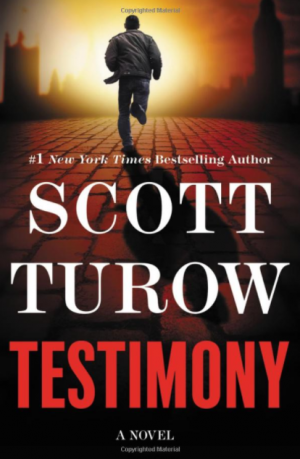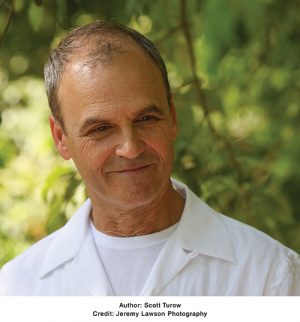Standard Of Review: Scott Turow's 'Testimony' Delves Into The International Criminal Court
Bestselling author Scott Turow limns an interesting corner of the law in his latest, entertaining novel.
 For the lawyers out there, have you ever been asked to complete an assignment that has anything to do with foreign law? If you are like me, the thought of doing research on the Hague Convention, the New York Convention, or even (gasp) another country’s law fills one with dread. In Scott Turow’s latest novel Testimony, it is a former U.S. Attorney and partner at a major firm who feels these jitters at the prospect of dealing with international law after he decides to take a job at the International Criminal Court and prosecute a case relating to a massacre in Bosnia. While Turow limns an interesting corner of the law that is rarely the subject of novels, the book suffers from being too heavy on exposition.
For the lawyers out there, have you ever been asked to complete an assignment that has anything to do with foreign law? If you are like me, the thought of doing research on the Hague Convention, the New York Convention, or even (gasp) another country’s law fills one with dread. In Scott Turow’s latest novel Testimony, it is a former U.S. Attorney and partner at a major firm who feels these jitters at the prospect of dealing with international law after he decides to take a job at the International Criminal Court and prosecute a case relating to a massacre in Bosnia. While Turow limns an interesting corner of the law that is rarely the subject of novels, the book suffers from being too heavy on exposition.
As Testimony opens, Bill ten Boom (who goes by “Boom”) is a fifty-something former U.S. Attorney and litigation partner at a major law firm who is burnt out on U.S. law and decides to accept an offer to become a prosecutor at the International Criminal Court at The Hague (the “ICC”). Boom’s first case is to prosecute the alleged murder of 400 Roma in 2004 at a refugee camp in Bosnia. The entire case essentially rests on one witness, Ferko Rincic, who claims he survived the heinous massacre by hiding in the privy. The case was initially brought to the attention of the ICC by Esma Zarni, an English barrister with whom Boom begins a relationship.
The case is also fraught with political implications. The U.S. military is concerned that it is going to be blamed for the deaths. Others believe that (fictional) Bosnian Serb leader and mass murderer Laza Kajevic (a thinly veiled allusion to Radovan Karadžić) was responsible. Eventually, Boom comes to learn that the case may be even more complicated than he initially thought, putting his life in danger.

Navigating Financial Success by Avoiding Common Pitfalls and Maximizing Firm Performance
Lawyers will definitely be interested in Turow’s depiction of the ICC, a court with which I imagine many readers are not familiar (including myself). Boom initially examines Ferko in front of a panel of three judges without actually speaking to him in advance. The panel hears evidence — including live testimony without cross-examination — to determine whether or not a case should proceed. Unfortunately, aside from the preliminary hearing that opens the novel, Boom does not do much actual lawyering; there are no depositions, brief writing, or full trials. Instead, he spends more of his time looking into Ferko’s allegations alongside his Australian investigator Goos. Despite being an experienced and heralded lawyer, Boom has difficulty navigating the perilous waters of Bosnian and Romany politics and figuring out who is attempting to undermine him. And Boom does not just face diplomatic difficulty; in one terrific scene, Boom and Goos are captured by men pretending to be police officers and are beaten and potentially led to their deaths.
 Unsurprisingly, because Boom’s case pertains to Bosnia and the Romany, Turow is forced to include a lot of exposition. For example, Boom is driven by former soldier Attila Doby, who has personality but serves as an exposition machine as she speaks in paragraphs about the U.S. military’s role in the Bosnian conflict. Some of this exposition could definitely have been trimmed.
Unsurprisingly, because Boom’s case pertains to Bosnia and the Romany, Turow is forced to include a lot of exposition. For example, Boom is driven by former soldier Attila Doby, who has personality but serves as an exposition machine as she speaks in paragraphs about the U.S. military’s role in the Bosnian conflict. Some of this exposition could definitely have been trimmed.
The expanded exposition is even more confusing for the reader because Turow has written a slightly alternate history; Kajavic is obviously similar to Karadžić but not identical. And a minor character in the novel is General Layton Merriwell, a heralded military officer who previously ran NATO’s military operations in Bosnia. Merriwell was nominated as chair of the Joint Chiefs of Staff and had presidential aspirations, only to be undone by leaks of his affair with his aide-de-camp at NATO. While Merriwell does not have an obvious real-life analogue (David Petraeus immediately comes to mind due to the affair), the difference between the world of the novel and real life creates a distracting dissonance.
The scenes between Boom and Esma are also unsuccessful. Esma essentially throws herself at Boom from the moment they meet. And when they do finally commence a romance, Turow spends pages and pages and pages describing the awesome power of their sexual relationship. The numerous explicit sex scenes described in the novel are a little too close to Fifty Shades of Grey than Presumed Innocent.
Sponsored

Early Adopters Of Legal AI Gaining Competitive Edge In Marketplace

Legal AI: 3 Steps Law Firms Should Take Now

The Business Case For AI At Your Law Firm


Is The Future Of Law Distributed? Lessons From The Tech Adoption Curve
Testimony is definitely a entertaining novel; the last hundred pages or so are particularly fast-paced. But it would have been better if Turow had trimmed down the exposition and the sex scenes (or, even better, he could have solved this problem by taking a page from Game of Thrones and including “sexposition” scenes).
(Disclosure: I received a review copy of this book.)
Testimony [Amazon (affiliate link)]
Harry Graff is a litigation associate at a firm, but he spends days wishing that he was writing about film, television, literature, and pop culture instead of writing briefs. If there is a law-related movie, television show, book, or any other form of media that you would like Harry Graff to discuss, he can be reached at harrygraff19@gmail.com. Be sure to follow Harry Graff on Twitter at @harrygraff19.
Sponsored

Navigating Financial Success by Avoiding Common Pitfalls and Maximizing Firm Performance








